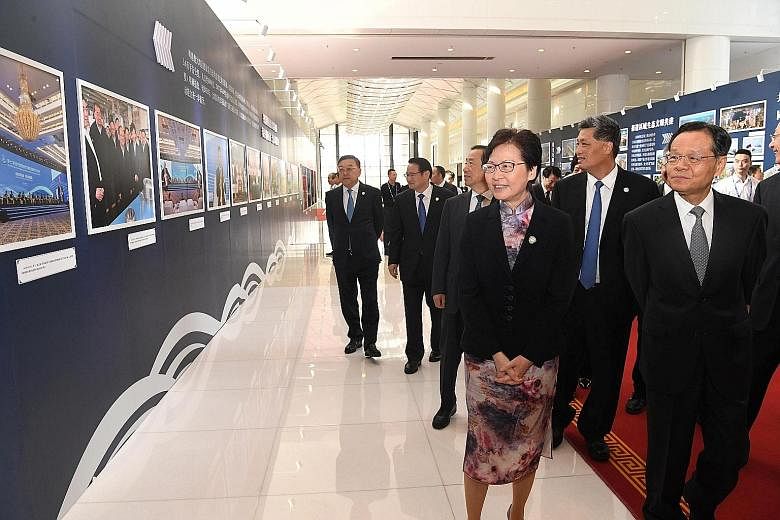HONG KONG • Ms Jenny Lee, 26, marched with a friend through the sweltering streets of Hong Kong the other day, hoisting an American flag over her shoulder.
"We hold this to tell the world that we want democracy and freedom," she said.
The authorities in China, however, are holding up those kinds of gestures as evidence of what Chinese officials portray as a US campaign to orchestrate the protests that have roiled Hong Kong for almost three months.
China's increasingly caustic accusations against the United States - in state media and official statements - reflect a deepening conviction that support for democratic rights in Hong Kong is part of a broader effort to undermine the Communist Party.
"It is their bete noire - democracy and democratic values," said Professor Jean-Pierre Cabestan of Hong Kong Baptist University and the author of China Tomorrow: Democracy Or Dictatorship?, referring to China's bugbear.
"The goal is to erase them from Hong Kong."
There has been no concrete evidence that the protests are anything but what demonstrators say they are: A largely leaderless upwelling of frustration and resistance to the mainland's encroaching control of Hong Kong's affairs.
But Chinese officials now point to a pattern of US actions that they say amounts to foreign interference, even collusion.
Some of the accusations amount to little more than crude disinformation, but others are grounded in just enough facts to spin a conspiracy theory of covert US nefariousness, intended to loosen Chinese leader Xi Jinping's authoritarian grip on power.
They include statements of support for the protests from congressional leaders and Democratic presidential candidates, and meetings between Hong Kong opposition figures and administration officials.
One such meeting with a di-plomat in the US Consulate in Hong Kong has been seized on by China, as was another in Washington with Vice-President Mike Pence and President Donald Trump's National Security Adviser John Bolton.
China's liaison office in Hong Kong on Monday, for example, vehemently denounced a relatively mild, bipartisan statement by the chairman as well as a ranking member of the House Foreign Affairs Committee, Mr Eliot Engel and Mr Michael McCaul.
They had expressed support for the protests and called on both sides "to refrain from violence and seek a peaceful accommodation".
A spokesman for the Chinese office replied in a statement that the two men "have ignored the facts, turned black into white, harboured evil intentions and nakedly interfered in Hong Kong affairs and China's internal affairs".
The depth and ferocity of China's accusations over Hong Kong suggest they are not merely propaganda intended for domestic or international audiences.
Instead, analysts said, they reflect the thinking of an increasingly anxious leadership that sees any manifestation of popular sentiment in the streets as a potential "colour revolution" like those that swept Georgia, Ukraine and later the Arab world.
China is also angrily pushing back against international criticism.
Foreign Ministry spokesman Geng Shuang denounced a statement by the Group of Seven leaders last week calling on both sides to avoid violence in Hong Kong. He accused the seven countries - Britain, Canada, France, Germany, Italy, Japan and the US - of "harbouring ulterior motives".
Meanwhile, the Trump administration has reacted inconsistently to the protests. Mr Trump, focused principally on the trade tensions with China, once called them an internal matter.
Others in the administration have spoken out more forcefully, however, and the protests have galvanised support across the political spectrum in Washington.
And that has given the Chinese fodder for their arguments. After initially ignoring the protests, officials have begun to respond to US statements more directly, while turning up the propaganda against the US in state media.
On the streets, Hong Kong's protesters have also mocked China's accusations, saying they were intended to belittle their grievances.
Ms Phoebe Chan, who accompanied her US flag-carrying friend, Ms Lee, ridiculed Chinese media reports that protesters were paid to participate. "We are coming out on our own," she said.










